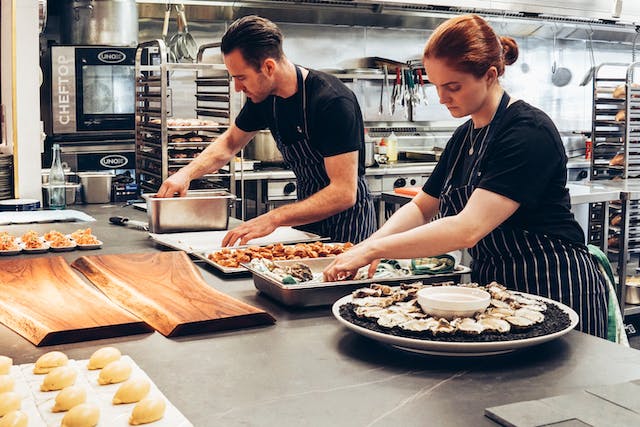Are you passionate about cooking? Do you dream of turning your culinary skills into a profitable business?
If so, you’re in the right place. In this article, we will explore the exciting world of culinary entrepreneurship and how you can transform your love for cooking into a successful venture.
Culinary entrepreneurship is the perfect blend of creativity, innovation, and business acumen. It’s about taking your unique culinary ideas and turning them into products or services that people love and are willing to pay for.
Whether you want to open your own restaurant, launch a catering business, or start a food product line, there are numerous opportunities to tap into the growing demand for high-quality and unique culinary experiences.
But where do you begin? How do you navigate the competitive culinary landscape and stand out from the crowd?
This article will provide you with practical tips, expert advice, and inspiring success stories to help you kickstart your culinary entrepreneurship journey. Get ready to take the first step towards turning your passion for cooking into a profitable and fulfilling business.
Why you should start a culinary business
Starting a culinary business comes with numerous benefits that make it an attractive proposition for aspiring entrepreneurs. One of the key advantages is the opportunity to turn your passion into profit. When you love what you do, it doesn’t feel like work, and that passion can be a driving force that propels your business to success.
Another benefit is the ability to express your creativity and showcase your culinary skills. As a culinary entrepreneur, you have the freedom to experiment with different flavors, ingredients, and cooking techniques, creating unique and memorable experiences for your customers.
Furthermore, the culinary industry offers a wide range of career paths and opportunities for growth. Whether you want to specialize in a specific cuisine, expand into new markets, or explore different aspects of the food industry, there is no shortage of avenues to explore.
In addition to the personal and professional benefits, starting a culinary business also has a positive impact on the local economy. By creating jobs, supporting local suppliers, and contributing to the community, culinary entrepreneurs play a vital role in fostering economic growth and development.
How do you start a culinary business?
Starting a culinary business requires careful planning and execution, but the rewards are well worth the effort. With the right strategy, dedication, and a sprinkle of culinary magic, you can turn your passion for cooking into a profitable and fulfilling venture.
Market research and identifying your target audience
Before diving headfirst into the culinary world, it’s essential to conduct thorough market research and identify your target audience. Understanding the market trends, consumer preferences, and competition will help you carve out a niche for your culinary business and tailor your offerings to meet the needs of your target customers.
Start by analyzing the local culinary scene and identifying any gaps or untapped opportunities. Is there a demand for a specific cuisine that is not being met?
Are there any emerging food trends that you can capitalize on? By conducting market research, you can uncover hidden gems and unique selling points that will set your culinary business apart.
Once you have a clear picture of the market landscape, it’s time to define your target audience. Who are your ideal customers?
What are their demographics, preferences, and buying behaviors? Understanding your target audience will enable you to tailor your menu, branding, and marketing efforts to resonate with them.
Consider conducting surveys, focus groups, or interviews to gather insights directly from your target audience. This will help you better understand their needs, preferences, and pain points, allowing you to design culinary experiences that exceed their expectations.
Remember, market research is an ongoing process. As the culinary industry evolves, so do consumer preferences and trends. Stay updated with the latest market insights and adapt your offerings accordingly to stay ahead of the competition and meet the ever-changing demands of your target audience.
Developing your culinary brand and unique selling proposition
In the competitive culinary industry, having a strong brand and unique selling proposition (USP) is crucial for success. Your brand is more than just a logo or a name; it’s the essence of your culinary business and what sets you apart from your competitors.
Start by defining your brand’s core values, mission, and vision. What do you stand for? What do you want to achieve with your culinary business? Having a clear sense of purpose will guide your decision-making process and help you stay true to your brand identity.
Next, focus on creating a memorable and cohesive brand identity. This includes designing a visually appealing logo, choosing a distinct color palette, and developing a consistent tone of voice for your brand.

Every touchpoint, from your website and social media profiles to your physical space, should reflect your brand personality and create a cohesive brand experience.
Your unique selling proposition is what makes you stand out in a sea of culinary options. It’s the combination of factors that make your culinary business irresistible to your target audience.
Whether it’s your secret family recipe, sustainable sourcing practices, or personalized dining experiences, your USP should be authentic, compelling, and aligned with your brand values.
Communicate your brand and USP effectively through all your marketing channels, including your website, social media, and promotional materials. Consistency is key – ensure that your messaging, visuals, and customer experience are in line with your brand identity and USP at every touchpoint.
By developing a strong brand and unique selling proposition, you will not only attract loyal customers but also cultivate a distinct identity in the culinary industry. Your brand will become synonymous with quality, innovation, and a culinary experience that is truly one-of-a-kind.
Creating a business plan for your culinary venture
A well-crafted business plan is the roadmap to success for any culinary entrepreneur. It outlines your goals, strategies, and financial projections, providing a blueprint for turning your culinary dreams into a profitable reality.
Start by defining your business objectives. What do you want to achieve in the short-term and long-term? Do you want to open a small cafe or a high-end restaurant? Are you planning to expand into catering or launch a food product line? Clarifying your goals will help you make informed decisions and allocate resources effectively.
Next, conduct a thorough analysis of your target market, competitors, and industry trends. This will help you identify opportunities, assess risks, and develop strategies to stay competitive in the culinary landscape.
Outline your products or services and define your pricing strategy. What will be your signature dishes? How will you price your menu items? Consider factors such as ingredient costs, labor expenses, and market demand when setting your prices.
Financial projections are a critical component of your business plan. Estimate your startup costs, including equipment, licenses, permits, and initial inventory. Create a sales forecast based on your market research and pricing strategy. Project your expenses, such as rent, utilities, and staff salaries. This will help you determine your break-even point and assess the viability of your culinary venture.
Additionally, your business plan should include a marketing strategy to promote your culinary business and attract customers. Define your target audience, outline your marketing channels, and allocate a budget for marketing activities. Consider both traditional and digital marketing tactics to reach a wider audience and maximize your brand exposure.
Remember, a business plan is not set in stone and should be periodically reviewed and updated as your culinary business evolves. It serves as a guiding document that helps you stay focused, make informed decisions, and adapt to changing market conditions.
Securing funding and financial management for your culinary business
Securing funding is often a major hurdle for aspiring culinary entrepreneurs. However, with a well-prepared business plan and a compelling pitch, you can increase your chances of obtaining the necessary funding to turn your culinary dreams into a reality.
Start by assessing your financial needs. How much capital do you require to launch your culinary business? Will you be self-funding or seeking external investors? Understanding your financial needs will help you determine the best funding options for your venture.
Consider traditional funding sources such as banks, credit unions, and small business loans. Prepare a comprehensive loan application, including your business plan, financial projections, and personal financial statements. Highlight the potential profitability and growth opportunities of your culinary business to increase your chances of securing a loan.
In addition to traditional funding sources, explore alternative options such as crowdfunding or seeking investments from friends, family, or angel investors.
Crowdfunding platforms allow you to raise capital by pitching your culinary business idea to a wide audience, while angel investors can provide funding and mentorship in exchange for equity in your venture.
Once you secure funding, it’s essential to manage your finances effectively. Implement a robust financial management system, including bookkeeping, budgeting, and cash flow monitoring. This will help you track your expenses, identify areas for cost optimization, and ensure the financial health of your culinary business.
Consider hiring an accountant or financial advisor to assist you with financial management tasks and help you navigate any complexities or compliance requirements related to taxes, payroll, and financial reporting.
By securing funding and implementing sound financial management practices, you will lay a strong foundation for the financial success and sustainability of your culinary business.
Setting up your culinary business – location, equipment, and staffing
Setting up your culinary business requires careful consideration of various factors, including location, equipment, and staffing. Each of these elements plays a crucial role in creating a seamless and efficient operation that delivers exceptional culinary experiences to your customers.
First and foremost, choosing the right location is key. Consider factors such as foot traffic, accessibility, parking availability, and proximity to your target audience. Is your culinary business better suited for a bustling city center or a cozy neighborhood? Conduct a thorough analysis of potential locations and weigh the pros and cons before making a decision.
Next, invest in high-quality culinary equipment that meets the needs of your menu and culinary style. Whether it’s commercial-grade ovens, refrigerators, or specialty equipment, having the right tools will enable you to deliver consistent and top-notch culinary experiences.
When it comes to staffing, hiring the right team is crucial. Look for passionate individuals who share your vision and values. Seek out chefs, cooks, and kitchen staff with experience in your chosen cuisine or culinary style. Additionally, consider hiring front-of-house staff who are knowledgeable, friendly, and customer-oriented to create a memorable dining experience.
Provide comprehensive training and ongoing support to your staff to ensure consistency in quality and service. Foster a positive and collaborative work environment that encourages creativity, growth, and teamwork.
Remember, your culinary business is only as strong as your team, so invest time and effort in building a talented and dedicated workforce.
Marketing and promoting your culinary business
Marketing and promoting your culinary business is essential to attract customers, build brand awareness, and drive sales. In the digital age, having a strong online presence is crucial for success in the culinary industry.
Start by creating a professional website that showcases your culinary offerings, brand story, and contact information. Optimize your website for search engines to improve your online visibility and attract organic traffic. Incorporate high-quality images, engaging content, and user-friendly navigation to provide a seamless browsing experience for your potential customers.
Utilize social media platforms to connect with your target audience and share enticing culinary content. Develop a content strategy that includes a mix of recipes, behind-the-scenes footage, customer testimonials, and promotions.
Engage with your followers, respond to comments and messages promptly, and build a community around your culinary brand.
Consider collaborating with influencers, food bloggers, or local media outlets to increase your brand exposure. Host culinary events, workshops, or tastings to showcase your culinary expertise and create buzz around your business. Participate in food festivals, farmers markets, or charity events to reach a wider audience and build relationships within the culinary community.
Invest in online advertising, such as Google Ads or social media ads, to target specific demographics and increase brand visibility. Monitor your advertising campaigns closely, analyze the data, and make necessary adjustments to maximize your return on investment.

Word-of-mouth marketing is a powerful tool in the culinary industry. Encourage your customers to leave reviews, share their dining experiences on social media, and refer your culinary business to their friends and family. Offer loyalty programs or incentives to reward repeat customers and foster customer loyalty.
Remember, marketing requires consistency, creativity, and adaptability. Stay updated with the latest marketing trends and techniques, and be willing to experiment and refine your marketing strategies based on the feedback and preferences of your target audience.
Navigating challenges and staying competitive in the culinary industry
The culinary industry is not without its challenges. Navigating these challenges and staying competitive requires resilience, adaptability, and continuous innovation.
One of the key challenges in the culinary industry is the ever-changing consumer preferences and food trends. Stay updated with the latest culinary trends and adapt your menu offerings accordingly. Experiment with new ingredients, flavors, and cooking techniques to keep your culinary experiences fresh and exciting.
Another challenge is the increasing competition in the culinary landscape. Differentiate yourself by offering a unique dining concept, exceptional customer service, or innovative menu items. Continuously gather feedback from your customers, analyze the competition, and make necessary adjustments to stay ahead of the curve.
Operational efficiency is crucial for success in the culinary industry. Streamline your processes, optimize your supply chain, and invest in technology that improves productivity and reduces costs. Embrace sustainability practices, such as sourcing locally and reducing food waste, to appeal to eco-conscious consumers.
In a rapidly changing digital landscape, embracing technology is essential. Utilize online reservation systems, mobile ordering apps, or food delivery platforms to enhance the convenience and accessibility of your culinary business.
Leverage data analytics to gain insights into customer behavior, preferences, and purchasing patterns, allowing you to make data-driven decisions and tailor your offerings to meet their needs.
Alternatively, you can consult the services of a financial planner or financial consultant for their insight.
Finally, prioritize the well-being and professional development of your team. A happy and motivated workforce is more likely to deliver exceptional culinary experiences and contribute to the success of your business. Provide opportunities for training, growth, and work-life balance to foster a positive and productive work environment.
By navigating challenges with resilience, embracing innovation, and prioritizing customer satisfaction, you can stay competitive in the ever-evolving culinary industry.
Key Takeaways
In conclusion, culinary entrepreneurship offers a world of opportunities for passionate individuals who want to turn their love for cooking into a profitable and fulfilling business. By starting a culinary business, you can express your creativity, share unique culinary experiences, and make a positive impact on the local economy.
To succeed in the culinary industry, conduct thorough market research, develop a strong brand and unique selling proposition, and create a comprehensive business plan.
Secure funding, manage your finances effectively, and invest in the right location, equipment, and staff. Market and promote your culinary business through various channels, stay competitive by embracing innovation, and navigate challenges with resilience and adaptability.
